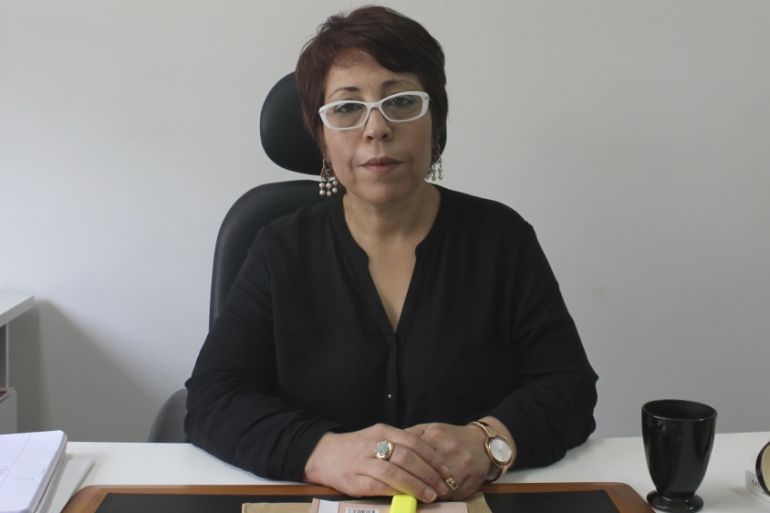Tunisia’s torture victims hope for justice at hearings
A new commission will be reviewing the cases of victims of Tunisia’s past regimes, yet some doubt its potential.

Tunis, Tunisia – In 1991, 16-year-old Selwa Bejawi was arrested because her brother was a leader in the then-banned Tunisian Islamist movement Ennahda.
Bejawi said she was taken from her high school to the interior ministry in downtown Tunis. Once there, she was forced to take off her headscarf and clothes and walk naked in front of a room full of security officers.
Keep reading
list of 4 itemsWill Israel’s war on Gaza sway South Africa’s election?
Masked Tunisian police arrest prominent lawyer for media comments
Gaza’s mass graves: Is the truth being uncovered?
“The least thing we went through was sexual harassment,” she told Al Jazeera. “We went through the same torture as men.”
“We used to be hung and beaten,” she continued, tears welling in her eyes. “The hardest part of prison was the first two weeks, when we went through questioning and torture.”
She said the Tunisian government arrested her to try to put pressure on her brother, who was on the run at the time.
RELATED: Tunisia transitional justice faces obstacles
After spending four months in jail, Bejawi was released with the help of human rights organisations. Once out of jail, she was placed under administrative control along with her entire family, which meant they had to check in at their local police station in Tunis multiple times a day.
The administrative control continued for 12 years and disrupted Bejawi’s daily life, preventing her from going back to school during that time.
![Selwa Bejawi was arrested when she was 16 years old and underwent torture during her four months in jail [Eric Reidy/Al Jazeera]](/wp-content/uploads/2015/06/1ea19544ee6c41f1a611e6081a50301c_18.jpeg)
Even after the control was lifted in 2003, security forces continued to follow her family’s daily movements until Tunisia’s revolution in 2011.
Bejawi is one of more than 10,000 people – a group that includes Islamists, leftists, trade unionists, and average citizens – who say they are victims of Tunisia’s dictatorial regimes, and who have submitted claims to the country’s Truth and Dignity Commission (TDC).
The commission was mandated by Tunisia’s new constitution, which was adopted in January 2013.
Its mandate is expansive, covering political, social, and economic crimes during the rule of Habib Bourguiba and Zine El Abidine Ben Ali, the two strongmen who successively ruled Tunisia between the country’s independence from France in 1956 and the 2011 revolution that toppled Ben Ali.
Almost a year after its creation last June, the TDC began hearing private testimonies from victims on May 27.
Now, the commission is preparing for public hearings that are set to begin by the end of summer.
RELATED: Blogger’s case tests Tunisia’s tolerance for dissent
Like other transitional justice efforts around the world, however, the TDC is facing challenges and controversies.
A hostile media environment, political pressure for amnesty – especially for economic crimes – and the politicisation of the transitional justice process along Islamist-secularist lines have tarnished the TDC’s image, according to political analyst Youssef Cherif.
The majority of people do not care. Among those who do care, I think more than half do not want to see this commission functioning.
“The majority of people do not care,” Cherif said. “Among those who do care, I think more than half do not want to see this commission functioning.”
Transitional justice processes are always fraught with difficulties, stated Rim el-Gantri, the head of the Tunisian office of the International Center for Transitional Justice.
“The problem is that the TDC was so slow,” Gantri said, noting that the commission has been working for over a year without producing any tangible public results.
By the time the TDC issues its report at the end of its four- to five-year mandate, Gantri worries that most Tunisians will have moved on.
Victims of Tunisia’s former regimes and supporters of the TDC are hoping that public hearings will finally show concrete examples of the commission’s work, and help the general public to understand why transitional justice is important.
“At least people will see something happening,” Cherif said.
Organising the public hearings is a delicate process, however.
In addition to preparing a location to host the hearings and working out the details of a live television broadcast, the TDC has to carefully select which cases it wants to make public, while also taking care of victims’ security.
“When we are talking about security, we are not just talking about physical security. We are also talking about psychological security,” Hayet Ouertani, one of the TDC’s commissioners, told Al Jazeera.
But victims such as Bejawi are looking to the public hearings as a source of catharsis and justice that is fundamental for Tunisia’s political transition from dictatorship to democracy.
“The people who are saying, ‘Let’s forget about the past, and move on,’ haven’t experienced what we did. It’s not up to them. They need to ask us,” she said.
“The state needs to recognise what they did, so the psychological pain lessens,” Bejawi continued. “The freedom and democracy they talk about after the revolution will not become concrete unless these injuries are recognised.”